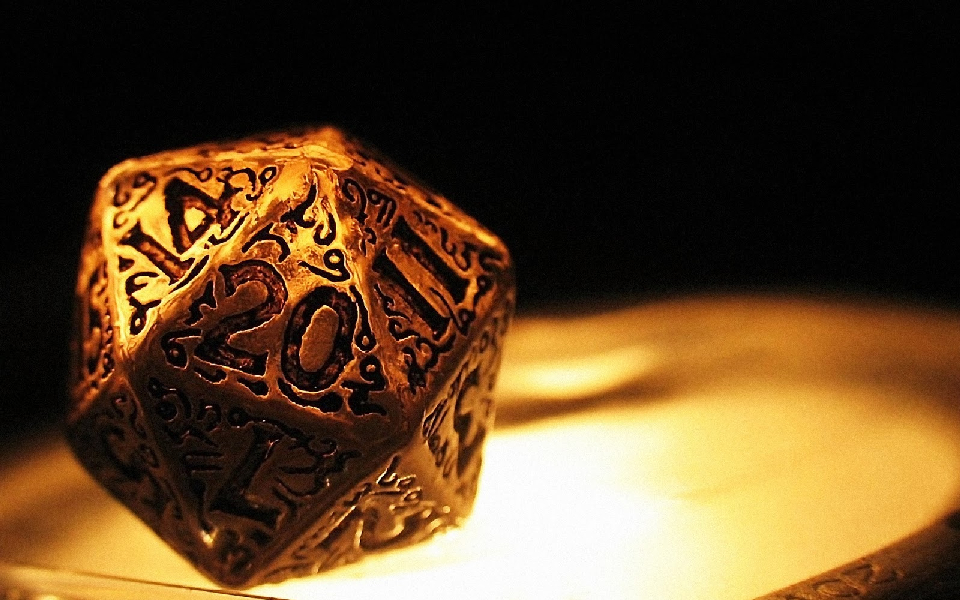2017/05/28
Do characters "possess" luck?
Perhaps they shouldn't
One of my favorite things about games is their narrative possibilities. I don’t mean it just in the prosaic sense of a succession of events. While that’s a fundamental part of their nature, the really fascinating aspect for me has always been their unique capability to evoke deeper meaning. However, there is one instance of this type of expression that’s always bugged me.
Far from lacking authorial voice, videogames —all games, in fact— can reveal a great deal about the philosophy of their designers. There’s a fairly common pattern, the luck stat, that perfectly exemplifies this.
Basically you have your character sheet (or equivalent), listing the numerical value of their stats. Typically, these values describe the capacity of the character’s strength, dexterity, intelligence, perception and so on.
In a lot of games there is also a curious stat: luck. The fact that luck is included among the rest tells us a whole darn lot about the designer’s mindset. It sends the message that luck is inherent to a person, that it’s a characteristic of each character. From this, we can deduce that there must exist “lucky” and “unlucky” characters.
In RPGs, the luck stat usually works only to nudge the results of some rolls towards a less or a more favorable outcome. Usually conflicts where we understand luck plays a role. A high luck value can e.g. increase your chances of finding a rare object or, —as a more meta and gamey mechanic— increase your chances of scoring a critical hit.
If we think about it, there’s nothing about this system that reflects the idea that luck resides within the person. Each character is still beholden to the “global luck” that is part of the world state.
More absurd is the notion that this value can increase. A lot of jRPGs increase your luck value as you level up. They are applying a metaphor for training to a completely abstract concept that escapes control of all mortals. In Nethack, the player can perform actions that may “exercise” or “abuse” their luck. This is a bit more interesting but the characters are still fundamentally at the mercy of the RNG.
How to make true mechanics around luck
I have been thinking about how one could use the concept of a personal, “improvable”, luck value in games. For me, it would be mostly applicable to games with a comedic tone.
I used to draw comics about a comedy character. A middle aged, bearded man member of a brotherhood of galactic do-gooders who fight with staves made of a special super-strong wood. The lore is deeper than you might expect.
But that’s beside the point. The comics often satirized common tropes in different media, and I devised a cool scenario for a game in that universe where a magical artifact granted its bearer “1.000.000 luck points”. Enough to go off the charts for anyone. If our protagonist got hold of it, it would have potential to “break” the game in funny ways.
Remember for example that club in the Constantine movie, where only proven telepaths could enter. The bouncer would hold up a card with its back to you, and ask what sign was printed on it. With this artifact, the player would be able to approach and ace the telepathy test, getting every card right by sheer luck despite a complete lack of telepathic ability.
Or imagine our protagonist punching random numbers on a keypad and entering the exact code that unlocks the safe with the bad guy’s plans. Or trying to communicate with an NPC whose language the player doesn’t know. With this artifact in their possesion, trying to utter random sounds would result in the exact words in that NPC’s foreign language matching exactly what the player wanted to say.
There’s a bunch of potential here for parody. There is a proverb that says “lucky at cards, unlucky in love”. If you believe that luck is a quality of each person, wouldn’t it make sense to have separate stats for “luck at cards” and “luck in love” that were inversely proportional?
I don’t believe in listing luck as a character stat in most games, as you may have surmised, but it’s fun to think about applications for this philosophy. I’d of course be interested in hearing other opinions.
